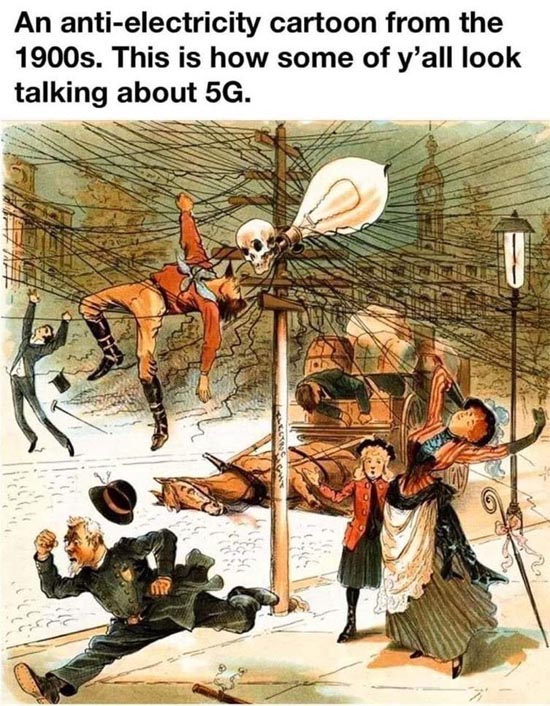An image circulating the Internet claims to show an anti-electricity cartoon from 1889 (or 1890).


The cartoon is often used to parody current anti-5G conspiracy theorists who believe the latest mobile cellular technology is dangerous and responsible for a number of ailments such as cancer, severe migraines and miscarriages. Many even claim it is responsible or exacerbating the COVID-19 pandemic of 2020.
An example is below.


An anti-electricity cartoon from the 1900s. This is how some of y’all look talking about 5G
The cartoon is genuine, attributed to 1889, and its creator is unknown. The artwork is entitled “The Unrestrained Demon”, referring to electricity itself, which was an innovation that was only a handful of years old at the time the cartoon was created.
The cartoon shows a man entangled in electricity wires, apparently dead, while other people on the ground are seen as either collapsing or fleeing.
Sponsored Content. Continued below...
It is likely that the man in the wires is a depiction of John Feeks, a linesman who died in Manhattan after touching a high voltage line in 1889. Reports at the time claim his burning body was tangled in the lines where it remained for around an hour in front of a crowd of onlookers before firemen eventually brought him down.
With that said, comparing this cartoon to the current resistance to 5G technologies may be a little unfair (on the anti-electricity proponents of the 19th century that is, not 5G conspiracy theorists.)
And that is because it could certainly be argued that, at the time, electricity’s adverse reputation among many was well deserved. During the late 19th century, there was little safety regulation or standardisation in this emerging industry. Electricity lines were often not adequately strung up above the ground, and they would frequently fall, leading to numerous electrocutions from those who they struck or those had tried to remove them, unaware of the dangers of doing so. Not to mention stories like the grotesque deaths of linesmen like John Feeks that the cartoon allegedly depicted.
Sponsored Content. Continued below...
As such, it was likely a natural instinct for many to resist the adoption of electricity, and much anti-electricity propaganda existed. Eventually the industry improved, and many lines were buried underground, removing the risk of electrocution, and the innovation became increasingly accepted.
The same doesn’t apply, of course, to 5G. While conspiracy theorists are often quick to list alleged ailments caused by this technology, they do so without scientifically backed evidence. While the long term effects of 5G are on-going, there is little comparison between 5G and the very tangible deaths caused by electrocution. And that’s because bygone opponents to electricity had one thing 5G conspiracy theorists don’t have; deaths that are directly and scientifically attributable to the subject of their protestations.
Finally, it perhaps should be noted that since the author of the cartoon is unknown, it is too unknown whether the intention of the cartoon was to promote the abolishment of electricity all together, which is often the goal of 5G opponents in respect to 5G. Of course looking at the cartoon, it can clearly be categorised as “anti-electricity” given its title and nature. But we have to take into consideration that the creator could have been highlighting the dangers of electricity, or promoting stronger regulation, as opposed to wanting to banish the innovation entirely.
Thanks for reading, we hope this article helped, but before you leave us for greener pastures, please help us out.
We're hoping to be totally ad-free by 2025 - after all, no one likes online adverts, and all they do is get in the way and slow everything down. But of course we still have fees and costs to pay, so please, please consider becoming a Facebook supporter! It costs only 0.99p (~$1.30) a month (you can stop at any time) and ensures we can still keep posting Cybersecurity themed content to help keep our communities safe and scam-free. You can subscribe here
Remember, we're active on social media - so follow us on Facebook, Bluesky, Instagram and X